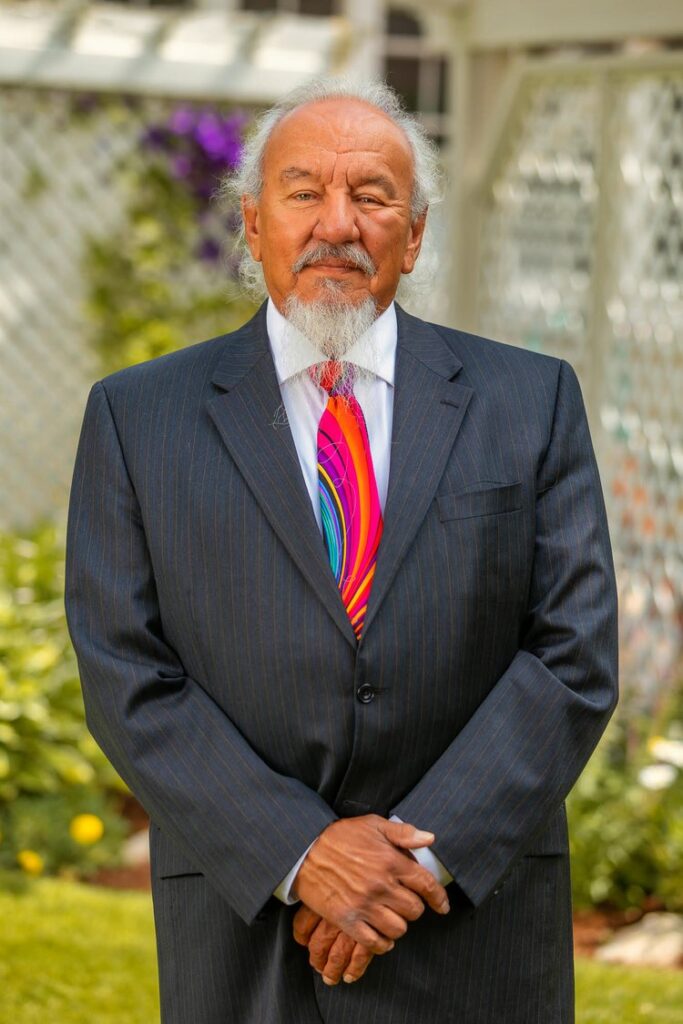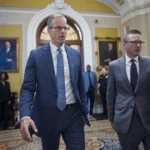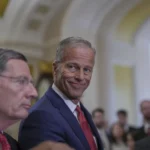Democratic Candidate for Wyoming State Superintendent Advocates Fully Funding Education, Choices for Students
Sergio Maldonado says the superintendent must act as the “teachers’ teacher” (Part 1)
- Published In: Other News & Features
- Last Updated: Sep 30, 2022

By Shen Wu Tan
Special to the Wyoming Truth
Sergio Maldonado, Sr., 68, the Democratic candidate running for Wyoming Superintendent of Public Instruction, hopes to make history as the first person of Northern Arapaho and Mexican descent to occupy that political office.
The Wyoming native was born on the Wind River Reservation, where he currently resides, and sometimes serves as a substitute teacher for Arapaho Schools in the Fremont County School District. Maldonado was appointed to the National Advisory Council on Indian Education by President George H.W. Bush and was the tribal liaison for the Northern Arapaho Tribe for Wyoming’s Office of the Governor from 2015 to 2017. For 23 years, Maldonado taught in classrooms in Wyoming, Arizona and New Mexico. He is currently pursuing a doctoral degree in curriculum and instruction from the University of Wyoming.
In the general election on Nov. 8, Maldonado will face off against Republican Megan Degenfelder, who defeated incumbent Brian Schroeder in the GOP primary race last month.

Maldonado recently spoke with the Wyoming Truth about his candidacy, declining student performance and the growing teacher shortage. What follows are excerpts from part one of the interview; part two will be published in the “Friday Focus” on October 7.
Why are you running for Superintendent of Public Instruction?
Maldonado: “I’ve been richly blessed: a mother who loved books, taught me to love books; a father who was a carpenter, very disciplined…I was an average kid in high school, came home from Tucson, Arizona – back home – went to a community college and again engaged in curriculum and teaching. I’ve kept up with education. I still read a lot of university journals just to see what’s the latest, keeping up with our state schools, our test score averages. And I see we are in sore need of some adjustments…I have that background experience which will enable me to be, first and foremost, an administrative leader. I think that’s very important for the role.
“I look at our students – good students, too often not-so-good choices, bad choices…So what can I do as a state superintendent to work with all of our 48 school districts to make it more doable so this whole notion of education can be transmitted to our students? I think that calls for leadership. It calls for communication. It calls for a level of empathy. The superintendent must serve as the teachers’ teacher…I know I’m a very good teacher. I’ve been blessed with that talent. Therefore, I know I have that responsibility to maximize that talent for the betterment of humankind.”
What are the most pressing issues in education in Wyoming? How should we address them?
Maldonado: “We have to fully fund education at a legislative level, bottom line. With oil and gas becoming less and less available, the rainy-day fund being extremely difficult to tap into, our legislative body must come to realize…we have to look at our funding models. What more can we do with the limited dollars and do it better? Let’s work smarter rather than harder. That’s one priority.
“We have to make more room for greater parental involvement. How about all the parents who aren’t working? Let’s make our classrooms friendly…When parents have firsthand life experience of what teaching is about, there’s a greater level of appreciation. What happens when young people, students of all ages, by third grade sometimes unfortunately, become disillusioned to the point where they don’t care about school anymore?
“What can we do to reinvigorate their willingness to learn? I think another piece of this puzzle is we have to share with our students that life is choice, and so we want to afford you choices. At a high school level, not everybody is going to be community college, university bound. Let’s put the options out there. How about trade schools? So, we have to provide choices for our students…And with respect to choices, music is math. We must have music and the arts back in our schools.”
How can Wyoming fix the teacher shortage?
Maldonado: “I believe we have wonderful teachers, but there is a huge concern of teacher burnout…So I have to ask myself: what are the conditions or variables that would call for a teacher to leave? Well, lack of funding for classroom supplies. But here’s another piece I see also: teachers need support. We need to let them know that we are going to pay them well, that we’re going to put a paraprofessional in the class, that the system, the administration…will work with them, with one another to address identified scenarios in the school.
“We are not a very popular state…Our cities and communities don’t have the luxuries, the stuff that a lot of people in today’s world want so that’s a given. A teacher who comes here must be fully aware of that. But once you get here, our teachers… must have a secondary home…Your teaching environment, your colleagues must be your secondary home…If you need to bring in professional help, then bring in professional help…If you need a therapist, then seek that out.”
As you mentioned, Wyoming’s oil, gas and coal revenues have been declining in recent years, which impacts the state’s education funding model. What’s the alternative for funding?
Maldonado: “I do not believe a sustainable model is continued federal funding for various programs. Those are wonderful with respect to research, but can you sustain them with the existing dollars you have? That’s going to be difficult. It’s a given that oil and gas monies have become less and less. I believe that…we have to look at everybody’s financial operations. Where are we supplanting versus supplementing programs? Every district must take that into consideration. If we’ve got three people doing project A, and the reality is project A can be accomplished with one person, remove the two. Let’s be fiscally conservative but not to the detriment of the existing staff…We have to be creative in what we’re going to do, always remembering that we only have x number of dollars. I think the third part is this: at a legislative level…we have to adhere to this notion called prioritizing. We do it in the budget. What is most important? Well, the first most important thing within the economic realm of education is the delivery of professional services: invest in our teachers.”
Newly released data from the 2021-22 Wyoming Test of Proficiency and Progress and Wyoming Alternate Assessment shows that overall proficiency rates among public school students in grade 3-10 fell by 0.8 percent in English language arts, increased 0.3 percent in math and declined by 0.1 percent in science from the previous school year. How can Wyoming gain back the losses from the COVID-19 pandemic?
Maldonado: “Yes, there is this decline, but we have to somehow not use COVID as an excuse, not use all the nuisance variables that society has created for our children as an excuse, and here’s where old school philosophy comes into play…I think we have to be willing to acknowledge that the numbers, statistically speaking, don’t bear up the notion that we are moving forward in a progressive manner. But what those numbers do tell us is that we have some areas of concern that we must look at with a microscope, with a magnifying glass, and we must collectively put our minds together and find resolution. Secondly, we must be willing to find a path of correction. And lastly, have a date when this correction will be at an acceptable level of ‘Aha! We did it.’ That’s how I see data.”













